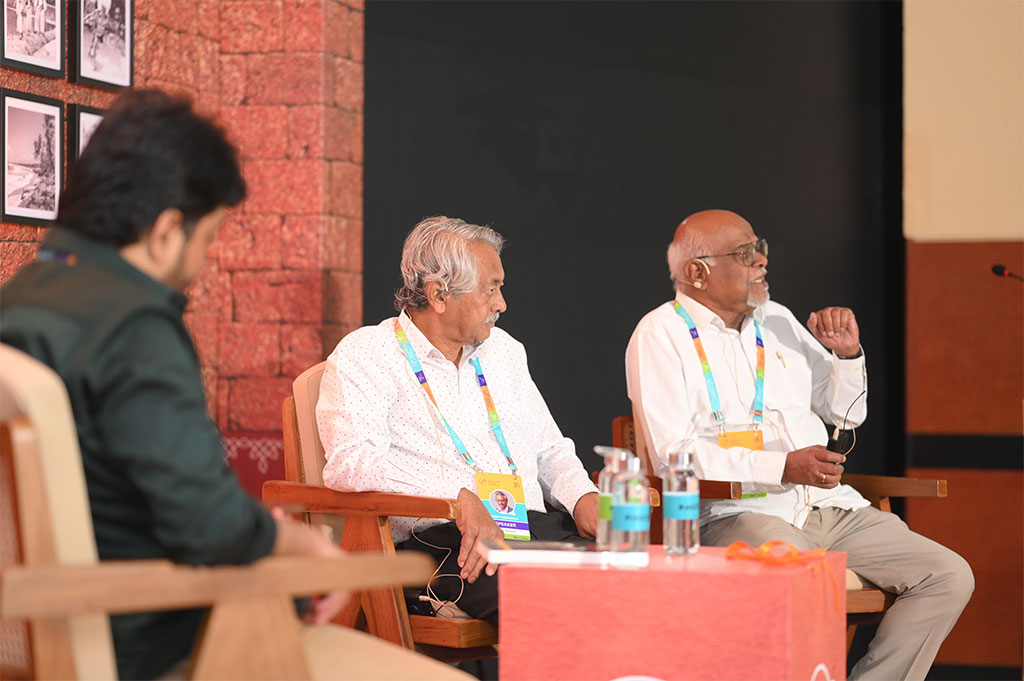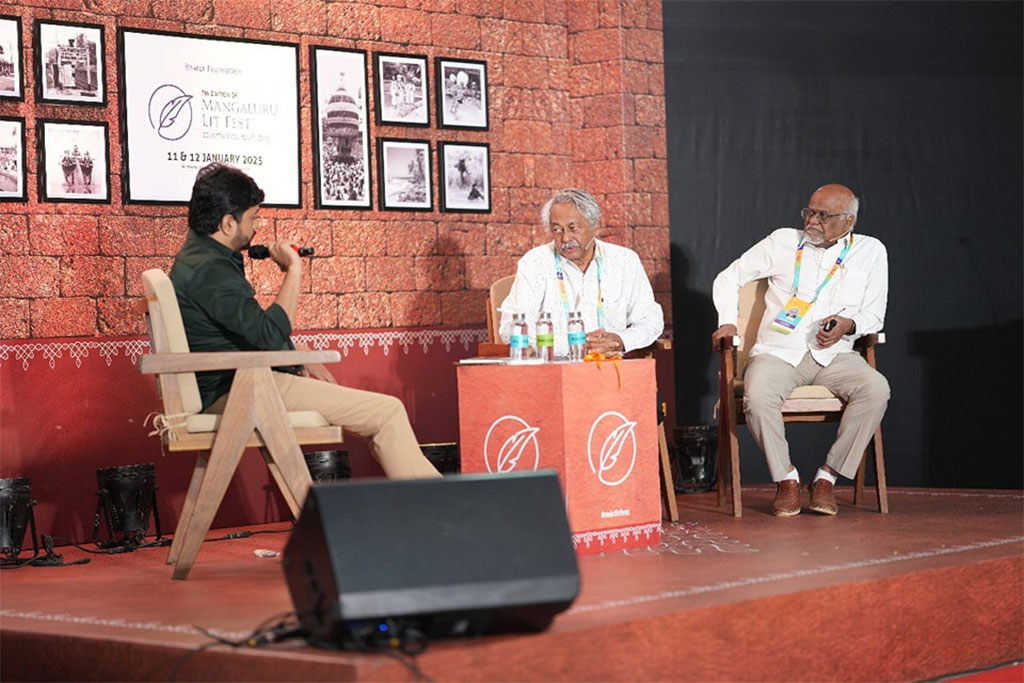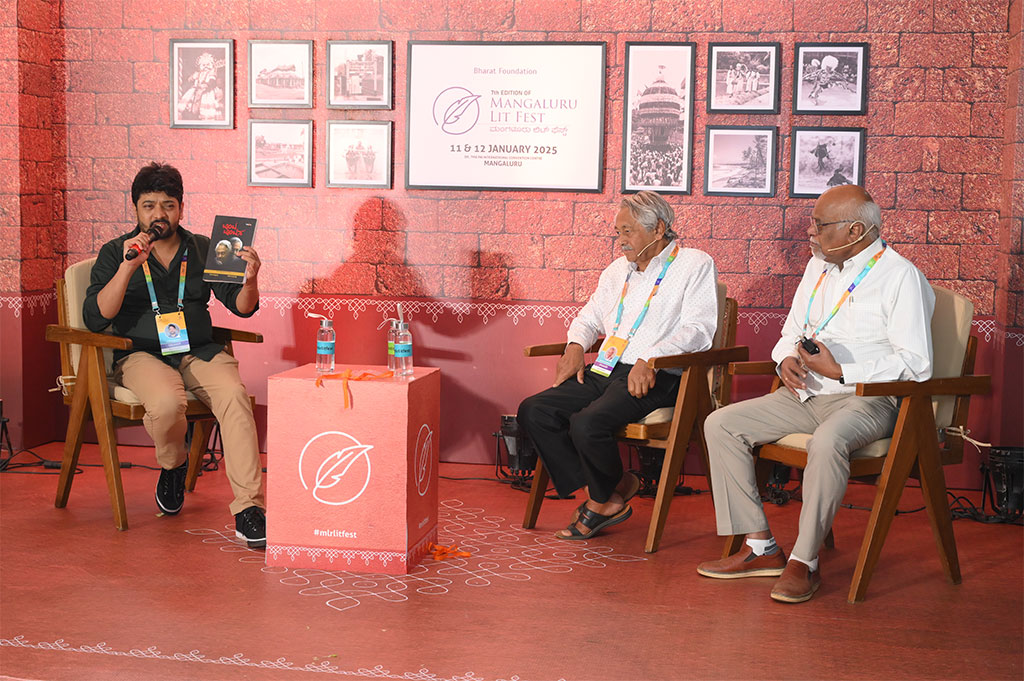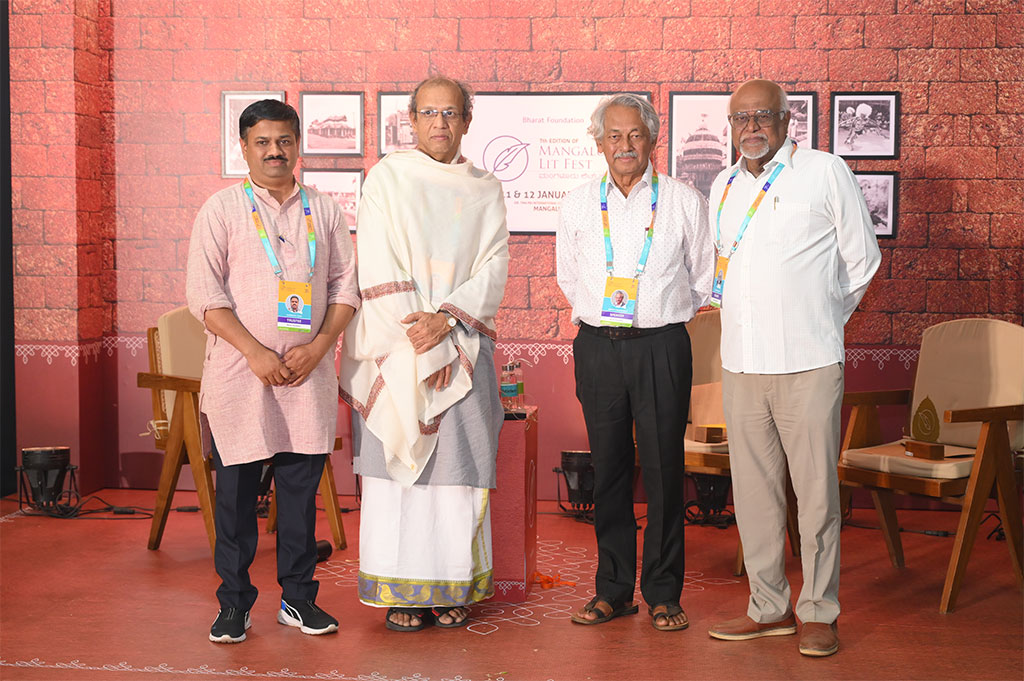Day 2 | Audi 1 – Session 4 : 2.00 pm
ಗಿರೀಶ್ ಕಾಸರವಳ್ಳಿ, ಗೋಪಾಲಕೃಷ್ಣ ಪೈ ಮತ್ತು ಅರುಣ್ ಭಾರದ್ವಾಜ್
ಗಿರೀಶ್ ಕಾಸರವಳ್ಳಿಯವರು ಭಾರತದ ಅತ್ಯಂತ ಪ್ರತಿಭಾನ್ವಿತ ಚಲನಚಿತ್ರ ನಿರ್ದೇಶಕರಲ್ಲೊಬ್ಬರು. ಇವರು ಮಣಿಪಾಲದಲ್ಲಿ ಬಿ. ಫಾರ್ಮ್ ಪದವಿ ಮುಗಿಸಿ ಪುಣೆಯ ರಾಷ್ಟ್ರೀಯ ಚಲನಚಿತ್ರ ತರಬೇತಿ ಸಂಸ್ಥೆಯಲ್ಲಿ ನಿರ್ದೇಶನ ವಿಭಾಗದಲ್ಲಿ ಡಿಪ್ಲೊಮಾ ಪದವಿ ಗಳಿಸಿದ್ದಾರೆ. ಇವರು ತಮ್ಮ 27 ವರ್ಷಗಳ ವೃತ್ತಿ ಜೀವನದಲ್ಲಿ 12 ಕನ್ನಡ ಚಿತ್ರಗಳನ್ನು ನಿರ್ದೇಶಿಸಿದ್ದಾರೆ, ಹಲವಾರು ರಾಷ್ಟ್ರೀಯ ಹಾಗು ಅಂತಾರಾಷ್ಟ್ರೀಯ ಪ್ರಶಸ್ತಿಗಳನ್ನು ಪಡೆದಿದ್ದಾರೆ. ಇವರ ಚಿತ್ರಗಳು ಅನೇಕ ಪ್ರತಿಷ್ಠಿತ ಚಲನಚಿತ್ರೋತ್ಸವಗಳಲ್ಲಿಯೂ ಸಹ ಪ್ರದರ್ಶಿತವಾಗಿದೆ.




ಮೂಲತಃ ಪೆರ್ಲ ಮೂಲದ ಗೋಪಾಲಕೃಷ್ಣ ಪೈ ಅವರು ಕತೆ, ನಾಟಕ, ಪ್ರಬಂಧ, ಲೇಖನ, ಮತ್ತು ಕಾದಂಬರಿಗಳನ್ನು ಬರೆಯುವುದರಲ್ಲಿ ಪ್ರವೀಣರು. ಇವರ ಕೆಲವು ಕೃತಿಗಳು – ತಿರುವು, ಈ ಬೆರಳ ಗುರುತು, ಹಾರುವ ಹಕ್ಕಿಯ ಗೂಡಿನ ದಾರಿ, ಮೊದಲಾದ ಚಿಕ್ಕ ಕಥೆಗಳು. ಆಧುನಿಕ ಚೀನೀ ಸಣ್ಣಕಥೆಗಳು, ’ಪೆರ್ಲ ಗೋಪಾಲಕೃಷ್ಣ ಪೈ’ ರವರ ’ ಸ್ವಪ್ನ ಸಾರಸ್ವತ ’ ಕಾದಂಬರಿಗೆ 2010 ರ ಸಾಲಿನ ’ಪ್ರತಿಷ್ಠಿತ ಕೇಂದ್ರ ಸಾಹಿತ್ಯ ಅಕಾಡೆಮಿ ಪ್ರಶಸ್ತಿ’ ದೊರೆತಿದೆ.
ಇವರು ’ ಬಿಂಬ ಬಿಂಬನ ’ ಎಂಬ ಪುಸ್ತಕವನ್ನು ಬಿಡುಗಡೆ ಮಾಡಿದರು. ಜನರು ಸಿನಿಮಾಗಳನ್ನು ಮನೋರಂಜನೆಗಾಗಿ ಮಾತ್ರ ನೋಡುತ್ತಾರೆ. ಅದನ್ನು ಸಿನಿಮಾದ ಮೂಲ ತತ್ವವನ್ನು ಅರ್ಥ ಮಾಡಿಕೊಳ್ಳುವುದಿಲ್ಲ. ಸಿನಿಮಾದ ತತ್ವ ಮೀಮಾಂಸೆ, ಬೇರೆ ವಿಷಯಗಳಿಗಿಂತ ತುಂಬಾ ವಿಕಸಿತವಾಗಿದೆ. ಸಿನಿಮಾವನ್ನು ಸಂಪೂರ್ಣವಾಗಿ ಅರ್ಥಮಾಡಿಕೊಳ್ಳಬೇಕಾದರೆ ಆದರೆ ಆಳದ ಬಿಂಬವನ್ನು ಅರ್ಥಮಾಡಿಕೊಂಡಾಗ ನಿರ್ದೇಶಕನ ಯೋಚನೆ ತಿಳಿಯುತ್ತದೆ. ಒಬ್ಬ ನಿರ್ದೇಶಕ ಬೇರೆ ಬೇರೆ ಮಾಧ್ಯಮಗಳನ್ನು ಬಳಸುತ್ತಾನೆ. ಒಂದು ಕಲೆಯನ್ನು ಮಾತ್ರ ಅರ್ಥ ಮಾಡಿಕೊಳ್ಳುವುದಲ್ಲ ಅದನ್ನು ಯಾಕೆ ಬಳಸುತ್ತಿದ್ದಾನೆ ಅನ್ನೋದನ್ನೂ ಅರ್ಥಮಾಡಿಕೊಳ್ಳಬೇಕು. ಸಿನಿಮಾಗಳಲ್ಲಿ ವ್ಯಾಖ್ಯಾನ ಮಾಡುವುದು ಬೇರೆ ಮತ್ತು ಹೊಂದಾಣಿuಟಿಜeಜಿiಟಿeಜ ಮಾಡುವುದು ಬೇರೆ ಎಂಬುದನ್ನು ಮಾರ್ಕೆಟಿಂಗ್ ಆರ್ಥಿಕತೆಯ ವಿಷಯವನ್ನು ಉದಾಹರಣೆಯಾಗಿ ಕೊಟ್ಟರು.
The session was ‘On Cinema’ which had Mr. Girish Kasaravalli and Mr. Gopalkrishna Pai ad the panelists. The event was moderated by Mr. Atun Bhardhwaj.
Girish Kasaravalli is considered one of India’s most talented film directors. In his career of 27 years he has directed 12 Kannada films, earning numerous national and international awards.
Gopalakrishna Pai, is a versatile writer known for his stories, plays, essays, articles, and novels. His novel “Swapna Saraswata” won the prestigious Sahitya Akademi Award in 2010. During the session, he released his book “Bimba Bimbana,” which focuses on film discourse.
The speakers highlighted that understanding art requires not only recognising what is being used, but also why it is being used. They pointed out that cinema philosophy is more evolved than many other subjects, and that a director’s use of various mediums should not be limited in order to preserve the desired imagery. This session offered insights into how cinema serves as more than just entertainment, outlining the philosophical depth and artistic intentions behind filmmaking.
